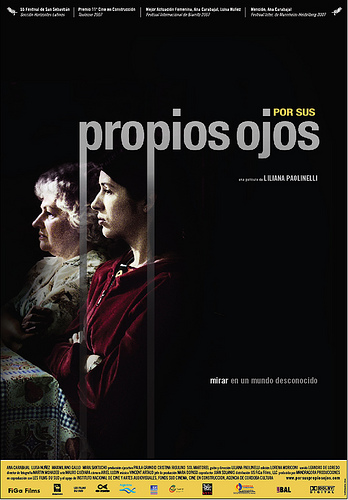Proper Eyes (Liliana Paolinelli, 2008) Argentina
Reviewed by Marissa Vogt. Viewed at the AFI Film Festival, LA
 The film, Proper Eyes, tells the story of a young Argentinean woman who tries to make a documentary about the women whose sons and husbands have been incarcerated in one of the more violent Argentinean cities, Cordoba. Written and directed by Liliana Paolinelli, this moving film is based on the true story about the writer herself who filmed a similar documentary seven years earlier. The settings, cinematography, and narrative all try to showcase the role reversal of men and women in the machismo driven country.
The film, Proper Eyes, tells the story of a young Argentinean woman who tries to make a documentary about the women whose sons and husbands have been incarcerated in one of the more violent Argentinean cities, Cordoba. Written and directed by Liliana Paolinelli, this moving film is based on the true story about the writer herself who filmed a similar documentary seven years earlier. The settings, cinematography, and narrative all try to showcase the role reversal of men and women in the machismo driven country.
Proper Eyes begins outside of the local neighborhood prison in Cordoba, where two young women, Alicia and Magdalena, are attempting to find women who will let them interview them on their lives since their sons/husbands incarceration. Alicia and Magdalena are attempting to make a documentary for their theses for graduate school. After meeting much resistance, Alicia finally finds a woman who is willing to speak to them about her son Luis’s imprisonment. Elsa continues to elude being taped by the girls until Alicia agrees to go visit her son in prison to clarify that Elsa being taped will not endanger his case. Alicia goes to the prison, where she encounters several shocking obstacles, and Elsa finally breaks down.
The scenes of prison life were particular interesting and revealing. During one scene Alicia brings a kiwi pie to Luis and the prison worker cuts the entire pie into tiny pieces to see if anything is hidden inside. Most disturbingly is the scene in which Alicia first enters the prison, the prison workers completely search Alicia in order to see if she is smuggling in goods. This idea is first elaborated in the girl’s documentary by other women who describe the horrors of being internally searched.
Without giving away essential pieces to the plot, the story focuses on Alicia’s discoveries about herself and her culture. In a world dominated by men, she attempts to assert herself by pressing forward in her study of the role reversal of men and women. The film also covers class issues; the graduate students are from a much higher social class than those they attempt to interview in a culture where class differences still command attention. By the end of the film, Alicia is portrayed as an amazingly accepting woman who surprises herself even in her journey of discovery.
The cinematography of the film played a large part in the storyline and beauty. Close shots of the actor’s faces as they contemplated their decisions helped to convey something that was easily lost in the subtitles. Long shots of Alicia, both walking into the prison behind bars and running away from the prison also helped to elaborate the numerous motifs seen through the film, such as imprisonment, the strength of Alicia’s will, and running from problems.
This film was a Spanish language film, and for the first time at the film festival, I felt as though something was lost in translation. The entire film I wished I had paid more attention in Spanish class in order to grasp more of the verbal emotional moments and phrasing. This may have made the cultural differences more clear, and the storyline more exact. Despite the language obstacle, the film seems to be a powerful work that may hit home more with audiences in its home country. However, the artistic beauty of the film and the development of the protagonist, Alicia, can be appreciated by anyone.
About this entry
You’re currently reading “Proper Eyes (Liliana Paolinelli, 2008) Argentina,” an entry on Student Film Reviews
- Published:
- 11.09.08 / 10pm
- Category:
- AFI Filmfest 2008, Films
No comments
Jump to comment form | comments rss [?] | trackback uri [?]